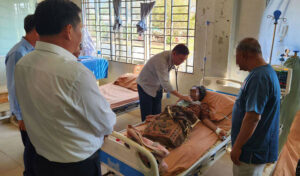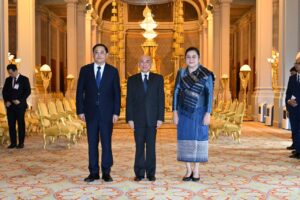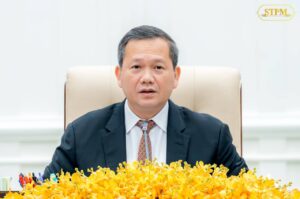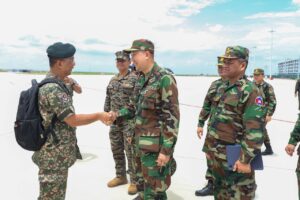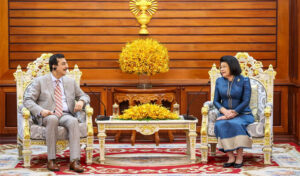Remarks by Samdech Techo Hun Sen at the Award Ceremony for the Hnonorary Doctorate Degree in “Leadership and Peacebuilding” from Dongguk University WISE
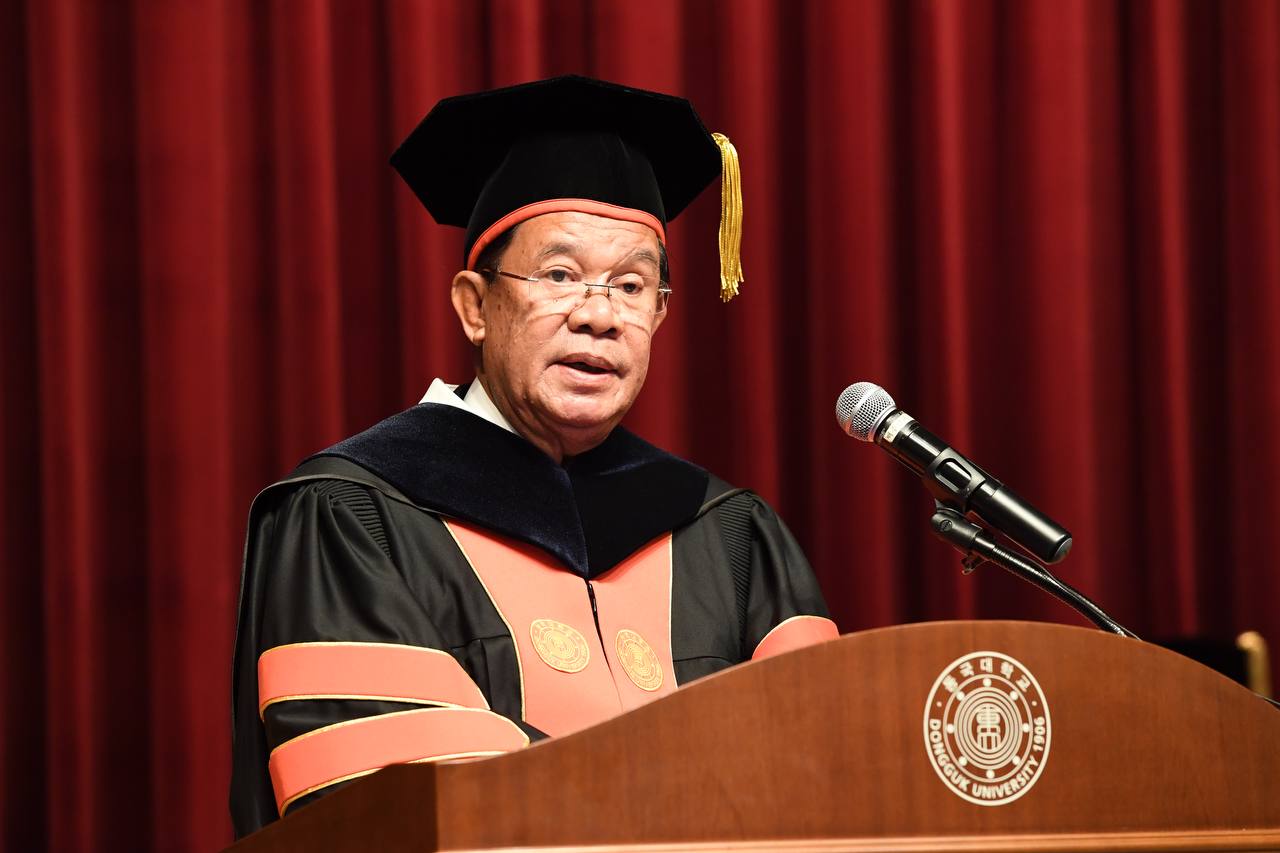 Remarks by Samdech Techo Hun Sen at the Award Ceremony for the Hnonorary Doctorate Degree in “Leadership and Peacebuilding” from Dongguk University WISE
Remarks by Samdech Techo Hun Sen at the Award Ceremony for the Hnonorary Doctorate Degree in “Leadership and Peacebuilding” from Dongguk University WISE
- Dr. Wan Ha Ryu, President of Dongguk University WISE;
- University management, professors and students;
- Excellencies, Ladies and Gentlemen!
Today, I am very pleased to receive an honorary doctorate degree in “Leadership and Peacebuilding”,in the beautiful North Gyeongsang Province, that is rich in historical, cultural and artistic values. I would like to express my gratitude to Dongguk University WISE for awarding me with this honorary doctorate degree and for organizing this ceremonious event.
For me, this honorary degree is a recognition of all the sacrifices I have made, including putting at stake my own life to free the nation from the clutches of a genocidal regime, and the efforts to rebuild the nation from scratch, while working to build peace, national conciliation and unification, until Cambodia reaching complete peace, territorial unity and a unified armed force under the jurisdiction of a single constitution. Currently, Cambodia is experiencing complete peace and territorial unity that has been unprecedented in the last 500 years of its history.
For Cambodia, this honorary degree is a recognition of the values of leadership, wisdom, patriotism, flexibility, tolerance and ownership of Cambodian people to the destiny and peace of our nation. This is the recognition of the role of Cambodia’s historical experiences and values of leadership in peacebuilding and nation-building, in providing significant benefits for cultivating spirits of peace, national unity, development and cooperation in the international arena.
This is also a clear testament that everything the Royal Government has done thus far is on the right path for national and international peace.
I would like to dedicate this achievement to all Cambodians, especially the Armed Forces, who have sacrificed their lives for the cause of peace, independence, territorial integrity and peacefulness in Cambodia. Drawing on these achievements, I hope that Cambodia’s lessons will help cultivate and strengthen the spirit of peace amongst youth worldwide, and inspire them to understand the true value of peace, the dangers of wars, the pain of losing loved ones, as well as cultivate a desire to protect peace as we know it and to end wars that are raging on, so that humanity can experience peace, development and prosperity.In this regard, I commend the efforts of Dongguk University for playing a significant role in fostering the value of peace within human resources development process, in addition to equipping them with the knowledge and skills necessary for professional works.
Wars can be ignited quickly and easily, but ending wars and building peace take a long time. In fact, since Cambodia fell into the flames of war as a result of the coup overthrowing His Majesty the late King Father Norodom Sihanouk in 1970, it took Cambodia almost 30 years to rebuild true peace, with the glorious success of the Win-Win Policy at the end of 1998. I would like to take this opportunity to remind that many countries that received intervention from the United Nations peacekeepers as Cambodia did during the 1990s are still suffering from the flames of wars. This is a clear testament to Cambodia’s firm ownership over its own peace. I, myself, strove to find and facilitate the first peace talks with His Majesty the late King Father Norodom Sihanouk in 1987, which was the starting point pushing for negotiations with other Cambodian parties and the Paris Agreements on 23 October 1991. Negotiations were sometimes tense and I returned empty-handed, but peace for the all Cambodian people was a motivating force for me to continue, because I knew we can not use war to end another war. I also used this philosophy to implement the Win-Win Policy to promote national unity and the integration of the Khmer Rouge forces into the Royal Cambodian Armed Forces.
With the wisdom of hindsight, having steered the nation through countless turning points in history, I can share with you a basic advice that leadership is about daring to make decisions in unclear, dangerous and risky situations, even if there is no full support and means. Being said that, these decisions must have clear direction and principles; and, for me, the most important principle is national interests and peace for the entire Cambodian nation. My decision has always been based on the principle of peacebuilding and peacekeeping, independence, territorial integrity and development, rather than creating wars, division and social unrest. Therefore, the politics that values peace is the strongest foundational pillar and shield, protecting the legitimacy and integrity of my leadership, as well as the whole society, on the difficult path of nation-building and development.
In the same spirit, Cambodia’s vision for regional and global peace rests on efforts to maintain rule-based international order, and to promote cooperation based on the principles of multilateralism, as well as the principles of mutual respect, mutual trust, mutual understanding and mutual benefit, to ensure international solidary, harmony and peaceful co-existence between nations. Our world is in a state of interdependence, so the peace and security of each country and the life of each nation should be of equal value. I would like to emphasize that it is the duty of every leader in the world to build peace and inclusive prosperity for humanity as a whole. Once we have considered the overall benefits of peace without discrimination, I am confident that we will be able to find common ground and a common starting point in coming to the negotiating table to narrow differences, ease tensions and resolve conflicts peacefully.
As I mentioned earlier, peace is easy to lose, so in addition to peace-building efforts, we all have an obligation to protect existing peace in remembrance of those who have been through wars, and constantly keep in mind the people and countries that have yet to experience peace.
Finally, I would like to wish Excellencies, Ladies and Gentlemen the best of luck and prosperity, and I pray for more peace in the world, for the generations to come.
Thank you!

